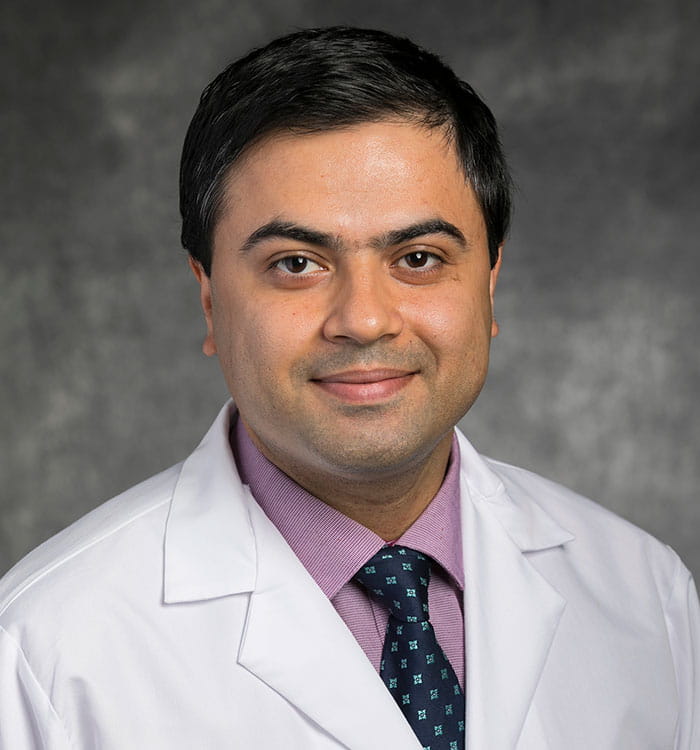UH-Trained ENT Specialist Happy to Rejoin Growing Team
August 25, 2020
Otologist-neurotologist Nauman Manzoor, MD, joins UH medical staff
UH Clinical Update | August 2020
 Nauman Manzoor, MD
Nauman Manzoor, MDAfter medical school in Pakistan, Nauman Manzoor, MD, spent three years in a neurosciences research fellowship at the Cleveland Clinic, studying auditory physiology and disorders of the auditory brainstem, including tinnitus. It was in these research circles that he came to know Cliff Megerian, MD, from University Hospitals as a world-renowned ear surgeon and researcher.
“I met him, and that changed my path in terms of joining UH for my otolaryngology residency training,” Dr. Manzoor says. “These years were critical in growing my interest in this field and I was fortunate to train with remarkable mentors and surgeons.”
Now, having completed advanced fellowship training in otology-neurotology and lateral skull base surgery at Vanderbilt University Medical Center – one of the nation’s leading programs in this specialty – Dr. Manzoor is back at UH as a member of the medical staff and the Department of Otolaryngology. He says he’s excited to be back working again with the UH physicians who trained him.
“I have a very strong connection to the UH system,” he says. “There’s obviously very strong mentorship here. There’s also incredible research infrastructure at UH, and I am very interested in pursuing clinical and translational research. All in all, it just made sense to come back to UH and start my career here.”
Dr. Manzoor says he plans to continue in UH’s tradition of outcomes research, focusing on hearing restoration outcomes with cochlear implants as well as advanced bone-anchored implants.
“There’s a lot of interest in looking at implants as a form of treatment for certain kinds of tinnitus and the indications for implantation are constantly evolving,” he says. “UH is in a unique position to run studies and trials which will help us answer some of these evolving questions and expand the volume of patients who will truly benefit from these interventions.”
As an ear specialist, Dr. Manzoor sees many patients with hearing loss, both conductive and sensorineural. Patient satisfaction after a successful surgery to treat or rehabilitate these conditions is significant, he says.
“For patients with otosclerosis, we can do a minimally invasive middle ear exploration and use procedures aimed at restoration of connection between middle ear bones and inner ear,” he says. “That surgery is very successful in about 90 percent of patients. We do get very good results and people are very happy with the restoration of their hearing. With patients with sensorineural hearing loss, we can offer cochlear implantation or bone-anchored devices. Over the past three decades, cochlear implants have been tested rigorously. It’s a remarkable thing – it can really alter the outlook on life for people.”
Skull base tumors such as acoustic neuroma, as well as other less common tumors that involve the skull base, are also an important part of Dr. Manzoor’s practice. For these conditions, he works as part of a multidisciplinary team to offer state-of-the-art treatment including microsurgical resection as well as stereotactic radiation.
“These tumors, although benign, are in a critical location where hearing, balance and facial nerves reside,” he says. “The growth of these tumors in unpredictable and so is hearing loss. The treatment for them is complex, but we work as a team with neurosurgery, audiology and speech therapy, radiation oncology and others to offer surgery or stereotactic radiation as a treatment. If the tumor is very small, sometimes we observe it. For hearing loss and balance issues, we work in a multidisciplinary fashion to offer comprehensive rehabilitation options.
“As a young clinician, I’m also very interested in doing research on acoustic neuroma and skull base tumors and disorders, as this is a topic of constant evolution,” he adds.
Rounding out, Dr. Manzoor’s practice is focused on patients with conductive hearing loss, inner ear disorders (hearing loss and balance), chronic ear disease, Eustachian tube dysfunction, and a variety of lateral skull base disorders including spinal fluid leaks, benign and malignant tumors and facial nerve disorders.
“For patients with Meniere’s disease or superior semicircular canal dehiscence (SSCD), optimized management entails careful use of medical and surgical therapies and close collaborative work with specialized vestibular therapist,” he says. “We can treat very complicated dizziness scenarios related to the inner ear in conjunction with our multidisciplinary teams.”
Like many surgical specialties, ENT surgery is providing more and more patients with minimally invasive options, Dr. Manzoor says – and this is true of the choices available at UH.
“With a minimally invasive endoscopic approach, you can work through the ear canal instead of an incision behind the ear,” he says. “We can treat eardrum perforation, infections, cholesteatoma, remove middle ear tumors and offer treatments of conductive hearing loss, such as otosclerosis. Patient goes home with a cotton ball and a Band-aid. It has really evolved in the last decade, and I expect the indications for it to expand.”
Dr. Manzoor sees patients and performs surgery at UH Westlake Health Center and UH Cleveland Medical Center. For more information or to refer a patient, email him at nauman.manzoor@uhhospitals.org or contact his office at 216-844-8540 or 216-844-EARS(3277).


